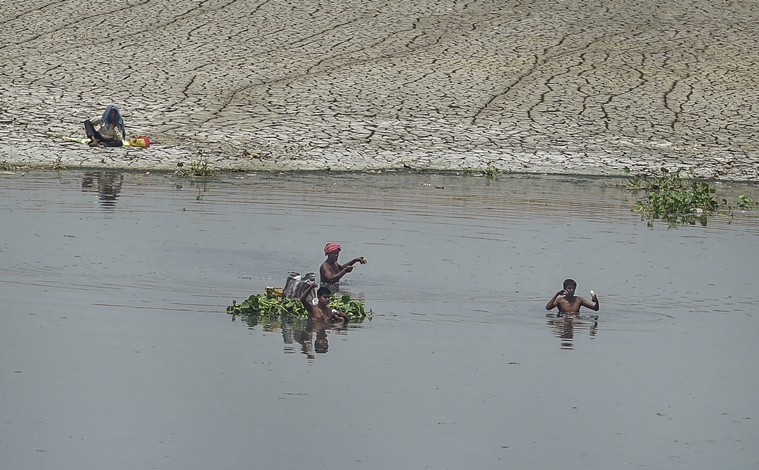 Fishermen look for a catch in the Yamuna river at Kalindi Kunj, on a hot summer day in New Delhi, Thursday, May 5, 2022. (PTI Photo)
Fishermen look for a catch in the Yamuna river at Kalindi Kunj, on a hot summer day in New Delhi, Thursday, May 5, 2022. (PTI Photo)A draft of Delhi’s new state action plan on climate change has been prepared and is to be presented before a steering committee chaired by the Chief Secretary before it is made public for comments, according to officials in the Environment Department.
It will then be submitted to the Ministry of Environment, Forest and Climate Change for approval. The process of consulting different departments to put the plan together began in January this year, and the draft was prepared by the Environment Department with GIZ providing technical assistance, according to a senior official in the department. Stakeholder consultations for Delhi’s previous climate action plan lasted for as long as seven years – from 2011 to 2018 – and the plan was finalised in 2019. The plan later expired, since it was meant to be for a decade, and the projections in it were also made for a decade, the official added.
The new plan will include temperature and rainfall data, and based on projections, will chalk out adaptation and mitigation strategies, the official said. The projections made in the plan will be till 2030. The common framework for state-level climate action plans chalked out in 2010 at a national consultation workshop calls for vulnerability assessments for various sectors and groups. It recommends the assessment of the “physical and economic impact” on vulnerable sectors. The previous plan, for instance, identified health, energy, water resources, urban planning (infrastructure, waste management and land use), transport, and agriculture, forest and biodiversity, as sectors that are vulnerable to the impacts of climate change.
“The new plan will have clearer linkages between the vulnerabilities assessed and the action,” the official said, pointing out that the previous plan was a more general one that looked at what was already happening in the city.
Best of Express Premium
“The revised action plans need to be more ‘actionable’. Much of the time, the plans are usually platitudes…what’s happening, what is the risk involved in the future, and the action part is still a little weak and vague. In Delhi, such plans will need a focus on clean energy transition in transportation, and technologies for emission control. We will have to develop systems to respond to the crisis that arises during heatwaves, even of infrastructure, electricity, water supply,” said Avikal Somvanshi, senior programme manager, Urban Lab, Centre for Science and Environment.
- The Indian Express website has been rated GREEN for its credibility and trustworthiness by Newsguard, a global service that rates news sources for their journalistic standards.

